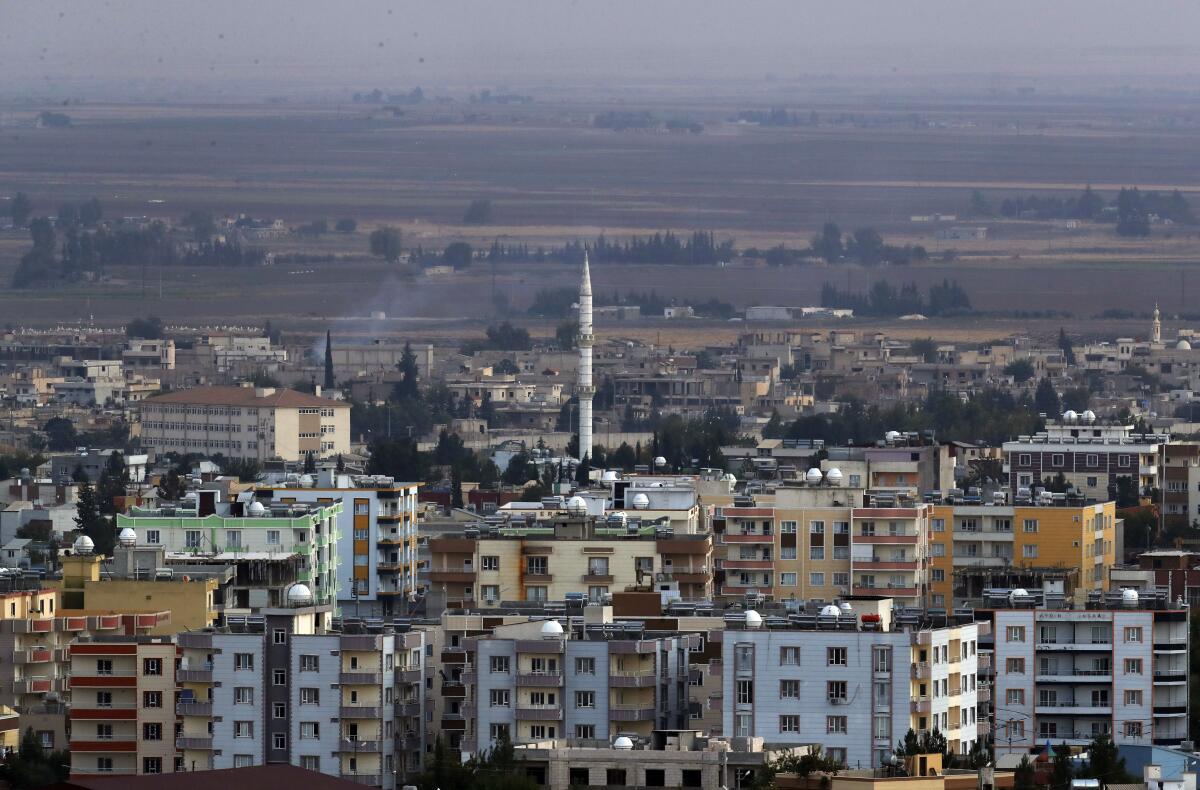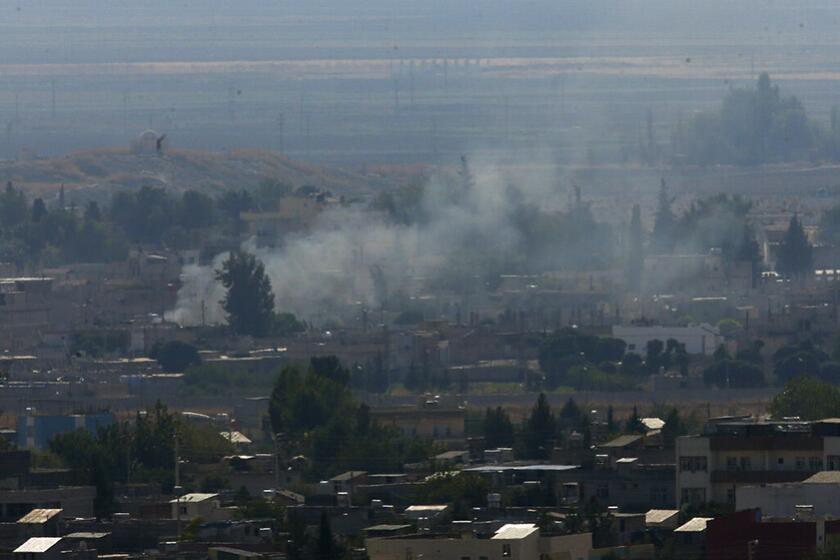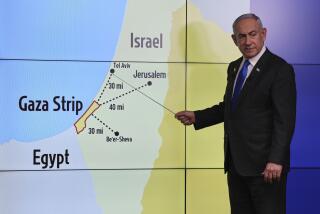Turkey wants Syrian forces to leave border areas, Erdogan aide says

- Share via
ISTANBUL — Turkish President Recep Tayyip Erdogan wants Syrian government forces to move out of areas near the Turkish border so it can resettle up to 2 million refugees there, his spokesman told the Associated Press on Saturday, adding that Erdogan will raise the issue in talks next week with Syria’s ally, Russian President Vladimir Putin.
Syrian government troops have moved in to several locations in northeastern Syria this week, invited by Kurdish-led fighters to protect them from Turkey’s invasion. That has complicated Turkey’s plan to create a “safe zone” along the border where it wants to clear out the Kurdish fighters it considers terrorists and resettle Syrian refugees now in Turkey.
Under an agreement between the U.S. and Turkey, a cease-fire took effect Friday evening to last five days, during which Kurdish fighters are supposed to pull back from border areas. The cease-fire has been shaken by fighting in one border town, and there so far has been no sign of any withdrawals by the Kurdish-led forces.
Erdogan’s spokesman, Ibrahim Kalin, said Ankara does not want Kurdish fighters to be able to continue to operate in border areas under control of Russian-backed Syrian forces. He said Syrian forces should move out of border areas because the refugees “don’t want to go back to areas under regime control.”
“This is one of the topics that we will discuss with the Russians, because, again, we are not going to force any refugees to go to anywhere they don’t want to go,” he said. “We want to create conditions that will be suitable for them to return where they will feel safe.”
Turkey has taken in about 3.6 million Syrians fleeing the conflict in their homeland but wants most of them to return.
President Trump is pushing back at criticism that his Syria withdrawal is damaging U.S. credibility and opening the door for a possible resurgence of the Islamic State.
U.S. forces were previously deployed in parts of northeast Syria alongside Kurdish-led forces, but President Trump withdrew them abruptly, opening the way for Turkey’s invasion 11 days ago.
Despite the cease-fire, exchanges of fire have continued inside a key border town, Ras al-Ayn, where Turkish-backed fighters have been encircling Kurdish-led forces. The Britain-based Syrian Observatory for Human Rights said the Turkish-backed fighters entered Syria on Saturday and advanced into Kurdish-held Shakariya, a village east of Ras al-Ayn that saw clashes and a Turkish strike a day earlier.
Turkey and the Kurdish-led forces traded blame for the continued fighting, with the Kurds saying the continued siege was a violation of the agreement and asking Vice President Mike Pence to ensure the deal’s enforcement.
On Saturday evening, a medical convoy including the Syrian and Kurdish Red Crescent was allowed to pass through the Turkish-backed fighters’ cordon to Kurdish-held areas in the town for the first time — a sign of easing tensions. The convoy delivered medical supplies and evacuated nearly 40 wounded civilians and fighters. A Turkish Red Crescent convoy entered parts of the town held by Turkish-backed forces and delivered supplies there.
Turkey’s Defense Ministry said it was “completely abiding” by the accord and that it was in “instantaneous coordination” with Washington to ensure the continuity of calm. The ministry accused Kurdish-led fighters of carrying out 14 “attacks and harassments” the past 36 hours, most in the town of Ras al-Ayn. It said the Syrian Kurdish fighters used mortars, rockets, anti-aircraft and anti-tank heavy machine guns.
Fighting continued Friday morning in a northeast Syrian border town at the center of the fight between Turkey and Kurdish forces, despite a U.S.-brokered cease-fire that went into effect overnight.
Turkey also said Saturday it had recaptured 41 suspected Islamic State members who fled a detention camp amid the chaos caused by the fighting earlier this week.
Turkish Interior Minister Suleyman Soylu said 195 other suspected IS members had already been recaptured. He said the captured IS suspects would be relocated to areas controlled by Turkey in northern Syria, including Afrin and al-Bab.
Last week, there were reports that, after a Turkish shell landed near the Ein Issa camp that holds members of IS families, more than 700 managed to flee amid the chaos.
Turkey’s state-run English-language broadcaster TRT World said the IS members and families were captured by Turkish-backed Syrian opposition forces.
Erdogan has accused Syrian Kurdish forces of releasing some 750 IS members and relatives amid Turkey’s offensive. The Kurds say they broke out of their camp a week ago, attacking guards, amid heavy clashes and Turkish airstrikes nearby.
The cease-fire agreement gives Turkey virtually everything it wanted to accomplish in the invasion, including requiring Kurdish fighters to vacate a swath of territory in Syria along the Turkish border.
The Kurdish-led force, which said it was in contact with the Americans during the negotiations, said it will abide by the halt in fighting but has not committed to any pullout. Erdogan warned Friday that Turkey will relaunch its assault on Tuesday when the deal runs out if the Kurdish fighters don’t pull out of the 20-mile zone running the entire length of the border.
More to Read
Sign up for Essential California
The most important California stories and recommendations in your inbox every morning.
You may occasionally receive promotional content from the Los Angeles Times.











